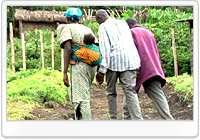
A decade after the United Nations issued Graça Machel’s landmark report on children affected by armed conflict, the context of conflict has changed dramatically. A strategic review of the Machel report is now under way to address this issue for the next 10 years. Here is the first in a series of stories testifying to the importance of that review, ‘Machel Plus 10’.
GOMA, Democratic Republic of the Congo, 2 October 2007 – Simon, 15, always loved to garden on his family’s farm in the Masisi territory of eastern DR Congo. At age 10, however, he was forcibly abducted by the Rassemblement Congolais pour la Démocratie (RCD) militia, and for several years he fought on the front lines in many battles and was forced to loot villages in order to survive.
After several unsuccessful attempts to escape, Simon (not his real name) managed to find refuge at the UNICEF-supported Centre de Transit et Orientation (CTO), a reintegration centre for children associated with armed forces. Staffed by about 30 teachers, mentors, counsellors and administrators, CTO works to reunite these children with their families and communities.
At the centre, Simon joined some 70 other children from many different militias and spent six months learning how to read, write, do carpentry and cultivate vegetables. He also learned how to live normally in society and get along with children who he had formerly been fighting on the battlefield.
Help for whole communities
Child recruitment is a major concern for humanitarian groups in DR Congo. In recent years UNICEF has played a key role in working to abolish the practice and focus resources on the young victims, in keeping with the ‘Paris Principles’ adopted by more than 60 countries this year.
To date, more than 8,000 children in DR Congo have been removed from militia groups and reintegrated into society with the help of programmes such as CTO.
But as a recent review of the landmark Graça Machel study on the impact of armed conflict on children shows, successful rehabilitation and reintegration of child soldiers requires more work.
“You work with the whole system to integrate children. Just giving them cash or education skills won’t work. It’s a community-building process,” says the Special Representative of the Secretary-General for Children and Armed Conflict, Radhika Coomaraswamy. By educating and providing livelihoods to former child soldiers, “you have not only helped the child, but the community to which the child is going,” she adds.
A tenuous reunion
After Simon’s time at CTO, UNICEF brought him back to his village and reunited him with his family. His parents were overjoyed because they thought he had been killed. He now works with his father on their farm and has started apprenticing with a local carpenter.
While Simon’s parents are grateful to have their son back, they fear for his safety, as the RCD has recently been entering their village again and kidnapping young boys. In the past few weeks alone, hundreds of youths have been recruited or re-recruited in the most volatile parts of the country.
The situation has become so grave, in fact, that UNICEF has temporarily stopped reuniting children with their families in villages where there is ongoing fighting and active child recruitment.







